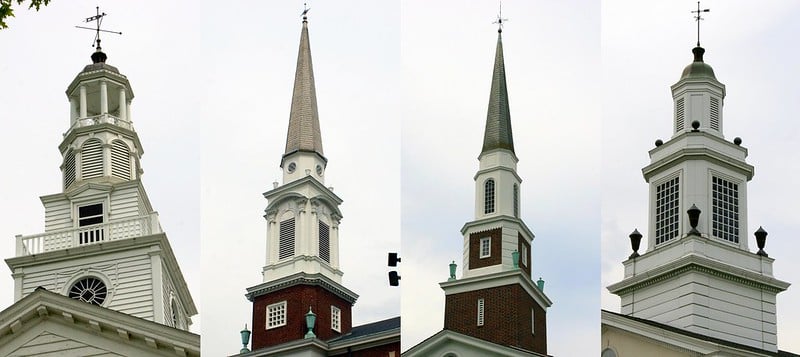American Protestantism is becoming “post-denominational.” So observes Mark Tooley, president of the Institute on Religion and Democracy, who thinks it likely that many denominations will just cease to exist over the next ten years.
He makes that point at Juicy Ecumenism in a post entitled Southern Baptist Turbulence. about turmoil in that church body, now the nation’s largest Protestant denomination with 13 million members.
In the course of his discussion of the controversy among Baptists over their Ethics and Religious Liberty Commission, which some Baptists complain is too liberal, he mentions that an increasing number of congregations no longer list “Southern Baptist” on their signs or webpages. Then he says this (my emphasis):
Likely many current U.S. Protestant denominations will not meaningfully exist in ten years, except as legal structures, sometimes with endowments. SBC churches are much better equipped for America’s post denominational reality because their congregations are already independent, and American post denominational evangelicalism is mostly Baptist in theology and ethos.
Indeed, congregations in the Southern Baptist Convention aren’t the only ones who are hiding their denominational identity. I’ve encountered LCMS congregations that drop the “Lutheran” label. Among Tooley’s own Methodists, of the 7,900 conservative congregations that have left the United Methodists, only about half of them have joined the new Global Methodist denomination. The rest will go independent.
And, of course, there are well over 21 million Christians who go to “non-denominational” congregations. That’s far more than the Baptists and far more than all of the mainline liberal denominations put together. Christian demographer Ryan Burge discusses the decline of denominations and the dramatic growth of nondenominations and concludes, in an article of this title, that The Future of American Christianity Is Non-Denominational.
So what would that mean, not having denominations?
Some would says the end of denominations would be a great achievement for Christian unity. But is it? Will the various strains of Protestant theology–Calvinism, Arminianism, Lutheranism, Anglicanism, Pentecostalism, etc.–become just private opinions of individuals in a generically Protestant church that includes and allows for them all?
If so, is that really unity? Each congregation would consist of members with different beliefs. Some would think it necessary to speak in tongues, while others would strenuously oppose that. Some would see salvation as being by grace alone through faith alone, while others would insist on various mixes of “decisions” and good works. Some would have a high view of Communion and Baptism, while others would not.
Church unity involves agreement (1 Corinthians 1:10), so there is great benefit in being in a congregation and a larger church body in which everyone agrees on doctrine and practice. I would argue that there is more net Christian unity in numerous denominations whose members agree with each other, than in single congregations with diverse confessions.
Besides, today is certainly not the time for accepting all theologies. Radically aberrant theologies–such as the prosperity gospel, the New Apostolic Reformation, the Word/Faith movement, to name a few–are running rampant in evangelical circles. Without a denominational accountability structure, how could heretical preachers and congregations be disciplined?
Also, what would all of the independent churches teach? Ministers would have to teach something about salvation, the sacraments, the Bible, and the Christian life. I grew up in a mainline denomination of the Campbellite tradition, which was similarly ecumenical, wanting to get rid of all denominational distinctives. So my church never taught me about the Trinity, the deity of Christ, or the Atonement. I first learned about those doctrines in books. Instead, we heard sermons about morality, psychology, and politics.
To their credit, though, today’s nondenominational churches are mostly conservative, so would surely teach such things, and, as Tooley says, most of them have, in effect, a Baptist theology. I suspect that what would happen in the large scale absence of larger denominational structures that every congregation–actually, every pastor–would formulate their own theological positions. Laypeople could gravitate to the ones they find the most agreeable.
But this would mean that, far from getting rid of denominations, every congregation would be a denomination unto itself! We would have thousands of denominations. With each pastor determining the teachings, we Protestants would have thousands of mini-popes.
What would probably happen is that congregations with similar teachings would get together with each other, co-operating with various ministries and holding common events. They might train their ministers using the same seminaries and maybe start a publishing house to provide resources. In other words, they would cluster together in what would be, in effect, a denomination!
Traditional denominations, of course, involve not only doctrine but specific structures of church government. Episcopalians have bishops. Presbyterians have elders. Congregationalists let each congregation rule itself. As Tooley points out, Baptists have a congregational church government. So do Missouri Synod Lutherans, though our congregations “walk together” (which is what “synod” means) by drawing on structures that Presbyterians and Episcopalians would recognize.
Today’s non-denominational churches are likewise congregational in their church government. The congregation calls its own pastors, owns its own property, sets its own policies. That can happen within the traditional strains of Protestant theology. It’s not necessary to eliminate those. And it’s possible to have independent congregations within larger denominational structures.
And multiple denominations can exist within the one Holy Christian Church, the Body of Christ, which has many highly diverse organs (1 Corinthians 12:12 ff.).
The word “denomination” basically means “name.” There is nothing wrong with having a name that describes who you are.
Illustration: Kingsport, TN: Steeples of Church Circle by Brent Moore via Flickr, CC BY-NC 2.0














